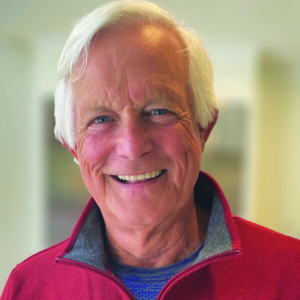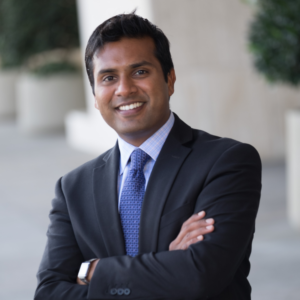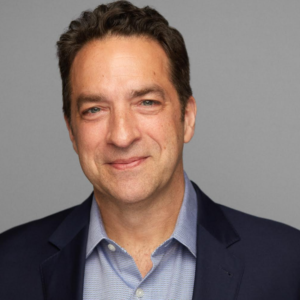August 26, 2021
Watch




Listen
Read

Kevin Sharer is the former CEO of Amgen, the largest biotech company in the world. He spent 20 years in the role, growing the company from $1 billion to nearly $16 billion. He is a former chief engineering officer in the Navy and Lieutenant Commander on fast-attack submarines. He has helped with more than 20 major CEO transitions for various companies. He teaches at Harvard Business School, where he is the co-creator of a successful course on the life and role of the CEO.

Dr. Shantanu Agrawal is Chief Health Officer for Anthem, Inc. Dr. Agrawal oversees Anthem’s enterprise health strategy, including medical policy and clinical quality, as well as the company’s industry-leading work to address the social drivers of health. He will also lead Anthem’s community health strategy and the Anthem Foundation.
Dr. Agrawal most recently served as President and Chief Executive Officer of the National Quality Forum (NQF), a non-profit organization dedicated to working with members of the healthcare community to drive measurable health improvements. He is also the former Deputy Administrator for the Centers for Medicare & Medicaid Services (CMS), where he led an effort to improve the physician experience with Medicare and was also one of the main architects of CMS’s strategy to address the national opioid epidemic. Dr. Agrawal also served as Director of the Center for Program Integrity (CPI), where he was instrumental in launching new initiatives in data transparency and analytics, utilization management and payment models.
Dr. Agrawal serves on the board of the Grameen Foundation and the Presidential Advisory Council of Brown University’s School of Public Health. He is also an Adjunct Senior Fellow at the Leonard Davis Institute of Health Economics at the University of Pennsylvania and Associate Clinical Professor of Emergency Medicine at the George Washington University School of Medicine.

Adam Bryant joined The ExCo Group, an executive mentoring firm, as managing director in 2017 after a 30-year career in journalism, including 18 years at The New York Times. In addition to his many roles there as a reporter and editor, he created the weekly “Corner Office” column in 2009, and interviewed 525 CEOs and other leaders over a decade. He has written three books based on the themes that emerged from those interviews, including his latest: “THE CEO TEST: Master the Challenges that Make or Break All Leaders,” published by Harvard Business Review Press. Since joining The ExCo Group, he has started popular interview series on LinkedIn with board directors, CEOs and CHROs, and he writes a monthly column on leadership for Strategy+Business magazine. Adam also is the senior adviser to the Reuben Mark Initiative for Organizational Character and Leadership at Columbia University.

Dr. Marisa Porges is known for her work on gender and education, leadership, and national security and is the author of What Girls Need: How to Raise Bold, Courageous, and Resilient Women (Viking Press, 2020). She is currently the eighth Head of School of The Baldwin School, a 130-year-old all-girls school outside of Philadelphia, that is renowned for academic excellence and preparing girls to be leaders and changemakers. She is an alumna of Baldwin and personally understands the power of its approach to educating girls: it provided the foundation for her own military service and work on national security and foreign affairs.
Prior to joining Baldwin, Dr. Porges was a leading counterterrorism and national security expert. Most recently, she served in the Obama White House as a senior policy advisor and White House Fellow at the National Economic Council, where she oversaw the development of domestic cybersecurity and consumer protection policies. She also has served as a research fellow at Harvard Kennedy School and at the Council on Foreign Relations, where her research focused on counterterrorism. In these roles, she traveled alone throughout the Middle East and Afghanistan to conduct research, interview former members of Al Qaeda and the Taliban, meet with Syrian rebel fighters in hiding, and serve as an embedded civilian advisor at NATO military headquarters in Afghanistan. She also worked as a counterterrorism policy advisor in the U.S. Department of Treasury and as a foreign affairs advisor in the U.S. Department of Defense. In all these roles, she stood out as one of a few – if not the only – women present, at any given time.
Dr. Porges started her career on active duty in the U.S. Navy, flying jets off carriers as a naval flight officer on EA-6B Prowlers. Ten years after the Navy first allowed women to fly jets into combat, she pursued her dream of being launched off an aircraft carrier while serving her country. She earned a B.A. in geophysics from Harvard, an MSc from the London School of Economics, and a PhD in war studies from King’s College London. Her awards include the National Committee on American Foreign Policy 21st Century Leader Award and the NATO Medal for service in Afghanistan. Dr. Porges lives outside of Philadelphia, with her family.
Scroll
It seems obvious: a lot of people think they’re good listeners, but I think a lot of people actually aren’t good listeners. What’s your observation?
Kevin Sharer 2:47
I was a lousy listener. What’s the dark side of confidence? All positives have negatives. The dark side of confidence is arrogance and my shadow’s arrogance. I would think, “Hey, I’m pretty smart. I’m experienced. I’m accomplished. Blah, blah, blah. I don’t need to listen. I got it. I’m quick. I got it.” That wasn’t true. It dawned on me that listening is really complex. It’s not passive. You have to create, as we say in the book, your own listening ecosystem because the signals are a varying intensity, and intensity does not necessarily correlate with significance. You want to be able to listen broadly, not just to your direct reports, not just the things that come at you naturally. If part of your listening isn’t an act of intentionality— like, I would go out and ride with sales reps once a quarter or I’d go visit factories. That was intentional. If all you do is depend on what naturally comes to you, you can be sure you don’t have the facts or you’re living in some reality distortion field. Listening is an art form. It has to be intentional, and you have to create an environment where it’s okay and expected and safe for people to tell you the truth. It is a real art form. Probably the biggest single revelation of my career is how powerful and necessary listening is, and how bad at it I was.
Gary Bisbee 4:32
Decisiveness and confidence are considered necessary leadership skills, but every virtue in excess can be a vise. As Kevin points out, overconfidence can cloud our ability to listen. Listening is more than being silent when somebody else is talking. It is intentional, conscious, and reflective. To elaborate on the importance of listening, particularly when beginning a new position, we will hear from Dr. Shantanu Agrawal.
As I talk to leaders such as yourself, they have pretty specific views about the importance of listening. Can you share whatever thoughts you have about that?
Shantanu Agrawal 5:12
It is absolutely critical. Coming into a new job, acknowledge that people have been engaged, whether it’s meeting my quality team or meeting the foundation team. They’ve been engaged in that work for years and years. Sitting down with them, especially at the beginning, and saying, “Alright, relay the story to me, the history, your priorities, how you have conducted this work,” and just being in a listening mode is really important. There’s a great emphasis, especially when you come into a leadership role or an executive role, you want to layout your 30, 60, 90-day plans and show that you are having an impact, but a lot of what you can do initially is be less focused on the impact you can drive and be more focused on understanding where the organization is, both its assets, its opportunities, and then using that to craft the vision of what you might do moving forward, what to change and what to preserve because the foundation is strong. Listening is an absolutely important element of that. You can’t get any of that without taking a step back and hearing what the team has to say.
Gary Bisbee 6:13
Listening provides us with necessary information. The next step is to translate that information into an idea or decision and communicate that vision to others. Our next guest, Adam Bryant, shares his views based on interviewing over 500 CEOs.
I’m sure you’re asked all the time for advice by people that are an up-and-coming class, but what advice would you give for up-and-coming leaders?
Adam Bryant 6:42
I go back to this core skill of simplifying complexity. One of the questions I’ve asked myself is, if I’ve interviewed hundreds of leaders, what is it about them? They come from such diverse backgrounds and different paths. What is a through-line? It is this habit of mind that they can simplify complexity, they can take all the complexity of their industry and the strategy and all that and can articulate it and communicate it in a simple way to get people to understand and follow. My advice to aspiring leaders is to not only build that muscle for yourself— If you’re writing a memo, how can it be shorter, more concise? If you’re building a PowerPoint deck, how can you use fewer slides? Always be doing that, building that muscle for yourself, but also watch other people. Watching other leaders through the lens of who does this well? What do they do that helps them do it well? Who doesn’t do it well? It’s a really effective lens for looking at the world and also becoming a better leader yourself.
Gary Bisbee 7:51
Adam talks about being good at communicating complex ideas and being observant and learning from already talented communicators. Communication and listening are skills that inform each other. Now, let’s say you check both those boxes: you’ve become a good listener and a proficient communicator. What’s next? Well, nothing we do exists in a vacuum, everything affects others. Lastly, we’ll hear from Dr. Marissa Porges who will discuss how leadership empowers teamwork.
Marisa Porges 8:25
At the end of the day, it’s about how you’re empowering others around you because all these skills are about you as a leader, but they’re really about how you reflect and support your people to make sure your people are their best, which makes you your best leading self. That is what being an impactful leader is: making others be their best so you, the organization, and your team move forward. Even as we’re talking about these individual lessons, it’s about how it connects you to others in a really powerful way. It helps particularly for women to know because it means you’re not in it alone. At the end of the day, that’s really what it’s about. You’re not in it alone. There are people out there who want to help professionally and personally. Building that team will make you your best self and will make you a more impactful leader.
Gary Bisbee 9:14
Interactions with others require nuanced and continuous interpersonal skills. We listen to understand, we understand to communicate, and after communicating, we listen again to make sure we are understood. This cycle is fundamental to leadership, as well as everyday life. It empowers us to be the best teammate we can be and, when we are at our best, we can lead our best. Due to the nature of interpersonal skills, there is less training readily available. Unlike finance or analytics, there is no crash course for listening. The challenge young leaders face is developing and refining interpersonal skills on their own. Consider following along on our journey at the Gary Bisbee Show, to hear from leaders of wide-ranging backgrounds, from CEOs to medical professionals to entrepreneurs. Our conversations extract what leadership means in healthcare and other industries. We analyze how leaders become who they are today, and perhaps through these interviews, we’ll further expand our understanding and application of the all-important interpersonal skills.
New episodes will debut every Thursday. Join me in conversations to gain advice and wisdom from CEOs, presidents, and healthcare experts. Health care leadership is hard work, but it becomes more manageable as we learn from the remarkable lives and careers of our guests. I’ll see you there.